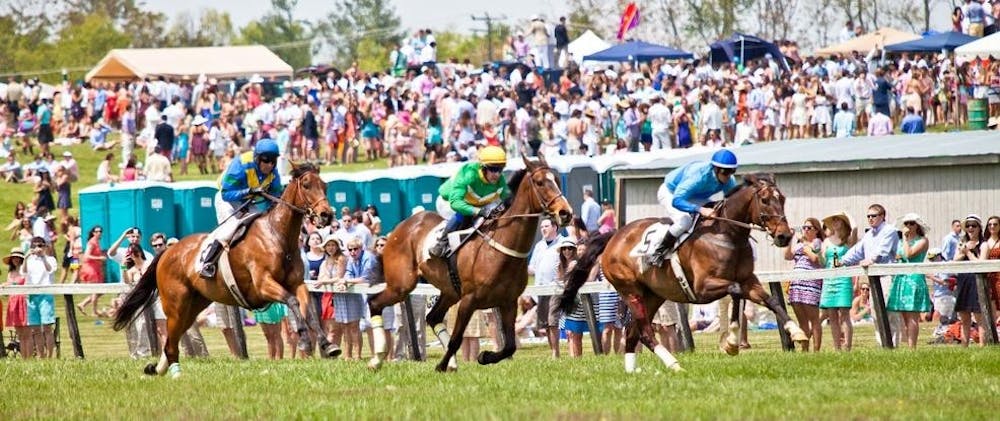What comes to mind when you think of Foxfield Races? Is it the bright, patterned Lilly Pulitzers? Celebrating good times with friends? Partying all day long? What about the horses?
Despite the many other traditions we might think of, horse racing lies at the core of Foxfield. But how many of us actually go to see the horses? How many of us think about why the horses are there, or if they’re having as a good time as the people in the crowd? By the end of the weekend, though the endless Instagram pictures remain, odds are, thoughts about the horses do not.
Although many Foxfield attendees claim the day isn’t so much celebrating the race itself as the festivities surrounding it, attendance of this event legitimizes steeplechase horse racing and the corresponding moral objections to the horse racing industry. Here, we share a story of a rescued horse and accessible, linked information on the horse racing industry for readers to consider. We hope to connect to this individual who has been affected by the horse industry and prompt you to consider the practices you might unwittingly support. Perhaps this brief introduction will even serve as reason enough to abandon a tradition predicated on the brutal objectification of a complex and emotionally-sophisticated mammal.
An equine rescue found this particular horse, a Hanoverian, in a disturbing case where she and dozens of other equines, and even cats and dogs, were hoarded around a dilapidated house and a poorly maintained barn. When the local authorities raided the property, several animals were able to be saved, but despite efforts from rescue owners and veterinary professionals, nearly 20 horses were either found dead or had to be euthanized soon after, due to their critical conditions. One horse who survived the initial ordeal is the subject of this story. Though she was never raced in her lifetime, she was used as a broodmare several times over, so her babies could make the owner a profit- a dire situation seen too often among mares rescued from these industries. She was in her late 20s when she was rescued and initially was not expected to live for much longer.
In spite of this, the gentle mare was given hope, and a name: Libby. Even though Libby made it out of her initial situation, she exhibited chronic pain from the incredible amounts of stress put on her legs and joints from being bred so often. Thankfully, Libby was given enough medication and medical help to live for another couple years at the rescue. Though she still lived with the chronic arthritis, that did not change her affable and warm demeanor. However, over the years the pain caused even the simplest movements to become complicated, and Libby was euthanized this past March.
Unfortunately, many horses bred for competitions experience similar horrible treatment, or even worse. And often, there aren’t good samaritans around to come in and save them before they endure such an unjust life. Many of the losing race horses are often sent to slaughter and end up on dinner tables across the world. For many of us here in the United States, the thought of having a horse slaughtered to use their meat as food seems unconscionable. Yet the demand for horse racing also satisfies the demand for horse meat. The support of one meets the support for the other.
Of course, this isn’t to say that the horses at Foxfield, nor all horses, are treated this way. We do not claim to know how those exact animals are treated. But even if the horses at Foxfield live in a best-case scenario, the reality is that this scenario is not ubiquitous. The support of horse racing normalizes situations of cruel and callous treatment of these animals.
If you went to Foxfield or are considering going next year, we implore you: consider the perspectives, feelings and lives of the animals bred for this sport. Is the race even a passing thought in your mind when you’re there? The festivities of Foxfield can easily be enjoyed without the need to spend your time and money supporting the horse industry. We ask you to consider the possibility of celebrating the day without the inclusion of the race and instead celebrate respect for horses.
*Name changed for both the privacy of the equine rescue and the privacy of the horse.
Evan Davis, Gabrielle Patterson and Isabelle Cifu are members of Animal Justice Advocates at the University.







